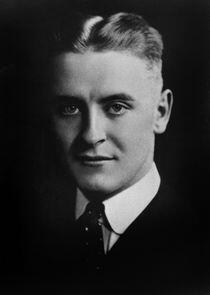
F. Scott Fitzgerald
Fitzgerald was born into a middle-class family in Saint Paul, Minnesota, but he was raised primarily in New York state. He attended Princeton University where he befriended future literary critic Edmund Wilson. He had a failed romantic relationship with Chicago socialite Ginevra King and dropped out of Princeton in 1917 to join the Army during World War I. While stationed in Alabama, he met Zelda Sayre, a Southern debutante who belonged to Montgomery's exclusive country-club set. She initially rejected Fitzgerald's marriage proposal due to his lack of financial prospects, but she agreed to marry him after he published the commercially successful This Side of Paradise (1920). The novel became a cultural sensation and cemented his reputation as one of the eminent writers of the decade.
His second novel The Beautiful and Damned (1922) propelled Fitzgerald further into the cultural elite. To maintain his affluent lifestyle, he wrote numerous stories for popular magazines such as The Saturday Evening Post, Collier's Weekly, and Esquire. He frequented Europe during this period, where he befriended modernist writers and artists of the "Lost Generation" expatriate community, including Ernest Hemingway. His third novel The Great Gatsby (1925) received generally favorable reviews but was a commercial failure, selling fewer than 23,000 copies in its first year. Despite its lackluster debut, The Great Gatsby is hailed by some literary critics as the "Great American Novel". Fitzgerald completed his last completed novel Tender Is the Night (1934) following the deterioration of his wife's mental health and her placement in a mental institution for schizophrenia.
Fitzgerald struggled financially because of the declining popularity of his works during the Great Depression. He then moved to Hollywood where he embarked on an unsuccessful career as a screenwriter. While living in Hollywood, he cohabited with columnist Sheilah Graham, his final companion before his death. He had long struggled with alcoholism, and he attained sobriety only to die of a heart attack in 1940 at age 44. His friend Edmund Wilson edited and published the unfinished The Last Tycoon (1941). Wilson described Fitzgerald's style: "romantic, but also cynical; he is bitter as well as ecstatic; astringent as well as lyrical. He casts himself in the role of playboy, yet at the playboy he incessantly mocks. He is vain, a little malicious, of quick intelligence and wit, and has the Irish gift for turning language into something iridescent and surprising."
Biography from the Wikipedia article F. Scott Fitzgerald. Licensed under CC-BY-SA. Full list of contributors on Wikipedia.
Part of Crew
Recently Updated Shows

The Creep Tapes
Based on a collection of videotapes in the secret vault of the world's deadliest and most socially uncomfortable serial killer, who hires his victims to film him for the day under false pretenses, each episode exposes a new victim from one of the fabled 'Creep Tapes'.

America's Funniest Home Videos
ABC's longest-running primetime entertainment show, America's Funniest Home Videos, returns for season 36 this fall with the same mission -- giving families something genuinely funny to enjoy together on Sunday nights.
"AFV," the longest-running primetime entertainment show in ABC history, returns for season 36 with the same mission - to provide viewers with hysterical moments that fly by at a dizzying pace.

The Real Housewives of Potomac
Just up the river from our nation's capital lies a hidden gem—Potomac, Maryland. Its rolling hills, gated mansions, sophisticated prep schools, and exclusive country clubs all serve to keep the area invitation-only. Sprinkled throughout this community are a handful of old-line, wealthy African-American families who have historically broken racial barriers to provide a life of privilege for their children. The Real Housewives of Potomac follows the upscale lives of six intriguing, well-to-do women: Gizelle Bryant, Katie Rost, Karen Huger, Charrisse Jackson-Jordan, Robyn Dixon, and Ashley Darby, all of whom have fought for their places in this society by way of legacy or marriage. In a town where entry is granted only through class, pedigree, and lineage, how far will these ladies go to secure their spot at the top of this prestigious circle?

The Traitors Canada
Follow a group of contestants – including some familiar faces – who live together as they complete a series of challenges with the goal of earning a cash prize. The catch? Some of the contestants are traitors who will attempt to deceive and manipulate their way to the prize instead of sharing it amongst the group. In this psychological adventure will the traitors be unmasked in time?

